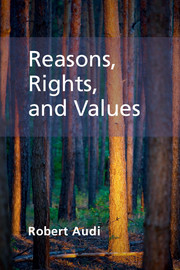Book contents
- Frontmatter
- Contents
- Preface
- Acknowledgments
- Introduction: practical reason, moral justification, and the grounds of value
- PART I REASONS FOR ACTION
- 1 Reasons, practical reason, and practical reasoning
- 2 Intrinsic value and reasons for action
- 3 The grounds and structure of reasons for action
- 4 Practical reason and the status of moral obligation
- PART II INTUITION, OBLIGATION, AND VIRTUE
- PART III RELIGION, POLITICS, AND THE OBLIGATIONS OF CITIZENSHIP
- Index
- References
3 - The grounds and structure of reasons for action
from PART I - REASONS FOR ACTION
Published online by Cambridge University Press: 05 May 2015
- Frontmatter
- Contents
- Preface
- Acknowledgments
- Introduction: practical reason, moral justification, and the grounds of value
- PART I REASONS FOR ACTION
- 1 Reasons, practical reason, and practical reasoning
- 2 Intrinsic value and reasons for action
- 3 The grounds and structure of reasons for action
- 4 Practical reason and the status of moral obligation
- PART II INTUITION, OBLIGATION, AND VIRTUE
- PART III RELIGION, POLITICS, AND THE OBLIGATIONS OF CITIZENSHIP
- Index
- References
Summary
We enter the world with a multitude of needs, entirely dependent on others, and utterly ignorant. But needs give rise to desires, experience remedies ignorance, and we learn to act on our own. Desire is essential for full blooded action: nothing wanted, nothing done. Belief is also essential for full-blooded action, but desire is a ground of action, in a way belief is not. For one thing, we act in order to fulfill desire, but not in order to fulfill belief. I will say more about this, but I want to begin by showing how even basic desires – those not grounded on other desires – can be grounded, and by comparing this kind of basis with that of their counterpart beliefs.
I Experience, desire, and belief
Experience is the fabric of our lives. Life as lived, by contrast with mere biological animation, is constituted by experiences. This is largely why a good life is one in which good experiences, those having intrinsic value, predominate. As we are naturally constituted, good experiences are central among those we want, though there is no particular description under which we must want them. In the content of our desires for things that are good, plurality reigns, and the good things we want need not bear that generic name.
It is clear that desires arise from experience, even if not solely from that source. Take an elemental case. The experience of eating a normal, satisfying kind of food (particularly where one needs food) commonly produces a desire for the sort of experience in question. To be sure, before children can develop concepts adequate for desire – which has a content that is in some sense conceivable to the subject – they must go through predecessor states of discrimination.
- Type
- Chapter
- Information
- Reasons, Rights, and Values , pp. 71 - 96Publisher: Cambridge University PressPrint publication year: 2015
References
- 1
- Cited by



